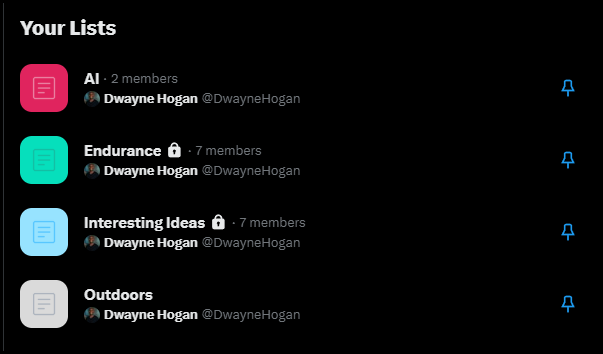An algorithm dictates most of my content consumption:
-
Spotify recommends music and podcasts.
-
YouTube suggests videos to watch.
-
Facebook tells me who to pay attention to.
-
Twitter tells me what news to pay attention to.
I often search specific topics outside the algorithm’s feed. But, for the most part, these platforms dictate my focus.
This year, I'm going to work to reduce my dependency on algorithms for content discovery.
I'm lucky to have grown up in a world where algorithms didn't dominate my life. I still consumed a lot of content, but I discovered it via human curators:
-
A human at a TV network decided on the content they deemed good.
-
A DJ at a radio station fed me music they liked.
-
A club DJ created hip hop mixtapes with new songs and artists to share.
-
Journalists and editors from newspapers and magazines wrote about topics they believed I’d find engaging.
Of course, even for human curators, data (like Nielsen ratings, album sales, Billboard charts, etc.) was used to make decisions. But it was still a human making those decisions.
When I'm deep into an algorithm to find new content, it feels like playing a slot machine. I'm looking for that one 3-cherry pull among 100. It's rarely a fulfilling experience.
I don't believe the solution is to abandon YouTube/Facebook/Spotify/Twitter entirely. They're amazing platforms. But, I'm going to switch up how I use them:
Read more newsletters and blogs
I signed up for the Tangle newsletter to avoid Twitter political rabbit holes for the next four years. Tangle covers top news stories, providing perspectives from both left and right outlets. I enjoy this balanced view.
I'm using blogs and newsletters as my primary discovery tools:
-
Tangle for political news
-
Pitchfork for music.
-
Dinner Music for music.
-
- I just signed up for this. They have a complete martial arts curriculum as part of their premium upgrade.
Curate my social feeds
Instead of relying on Facebook/LinkedIn/Twitter/Instagram feeds to tell me what and who to pay attention to, I'll create lists of specific profile URLs and use Twitter lists. When I want to chill and consume content, I'll visit those links.

Consume content from YouTube channels I’ve subscribed to
I appreciate YouTube's ability to hide their algorithm feed when I open the app by disabling your watch history. Instead of relying on it for content suggestions, I will focus on my subscribed channels.
Listen to my subscribed podcasts
I need a separate podcast app. Spotify makes it too tempting to go down the algorithmic discovery rabbit hole.
Read books
I've been developing my workflow for turning the non-fiction books I read into knowledge, experimenting with Ryan Holiday's notecard system and other second brain systems. These methods of reading and capturing knowledge often give me the same dopamine hit as scrolling on Facebook.
Bonus #1: Read newspapers (paper version)
I recently attended an event at my local library. While waiting for it to start, I read the day's newspaper. I really enjoyed the experience.
I grew up in the DC area, and reading the Washington Post sports section was a daily ritual. I miss reading the news and forming my own opinion, versus scrolling through a long list of comments on Twitter or news sites. I'm considering having paper delivery (if that's still possible).
Bonus #2: Search for old stuff on Google
When I'm doing research on Google, one thing I like to do is to look for old content. Google's algorithm prioritizes fresh content. This pushes down gems in Google Search that may have been 10 or 20 years prior.
To look for older content in Google, just add to your search "before:(year)". For example
how to do xeriscaping before:2010Which displays this interesting article from 2002: The Seven Principles of Xeriscape
Disclaimer: The hypocrisy...my work as an SEO consultant relies on algorithms. I know. But, my mission isn't to reverse engineer algorithms so that companies can share crap, but to help teams build better websites. And I do believe that Google's guidelines help point people towards that ideal.
Control what you consume
I recognize human curation isn't perfect. But, comparing my mental health when I relied on human curation versus today's reliance on algorithms, the difference is clear.